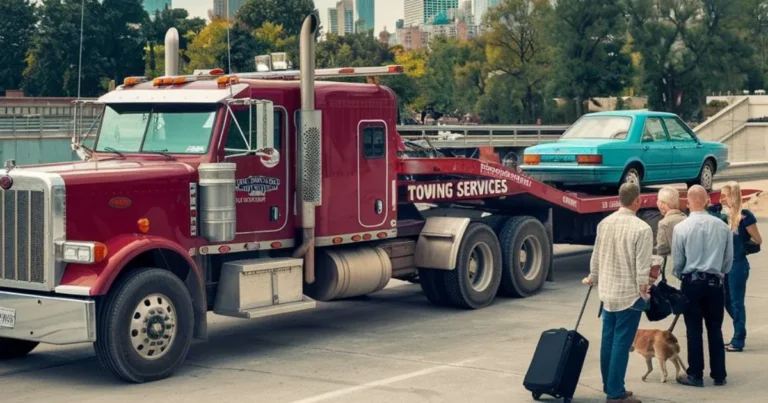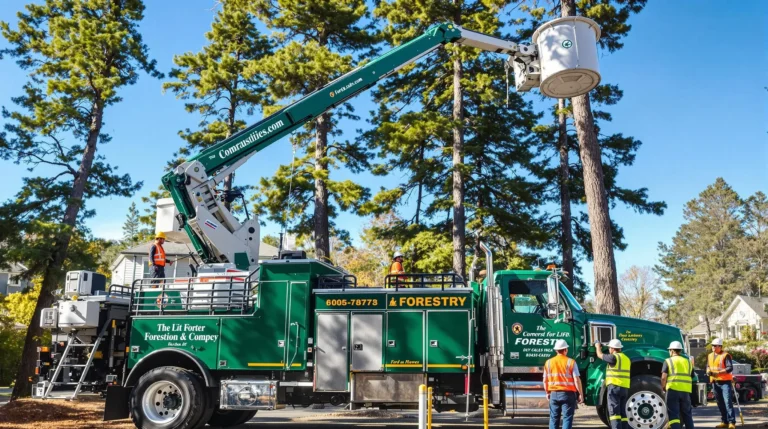10 Amazing Secrets of Truck Truck Drivers: Ultimate 2024 Guide

Ever wondered what life is like for a truck truck driver navigating the endless highways? Truck truck drivers are the backbone of our economy, ensuring goods reach every corner of the country. From food and clothing to electronics and construction materials, these professional truck drivers keep our world moving. In this article, we’ll delve deep into the world of truck truck drivers, uncovering the challenges, rewards, and realities of life on the road.
1. The Journey to Becoming a Commercial Driver
Commercial drivers are more than just operators of large vehicles; they are skilled professionals who undergo extensive training and certification. Becoming a truck truck driver requires dedication and adherence to strict regulations to ensure safety on the roads.
Obtaining a Commercial Driver’s License (CDL)
The first step is acquiring a Commercial Driver’s License (CDL). This involves:
- Education Requirements: A high school diploma or equivalent is typically required.
- Training Programs: Enrolling in accredited truck driving schools that offer courses on vehicle operation, safety protocols, and regulations.
- Driving Tests: Passing both written exams and practical driving tests that assess knowledge of federal laws, vehicle inspection, and driving skills.
- Background Check: Undergoing a thorough background check to meet the standards set by the Department of Transportation (DOT).
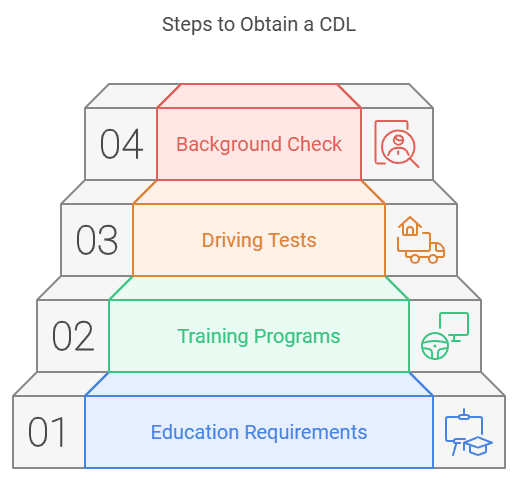
Compliance with Federal Regulations
Truck truck drivers must comply with regulations enforced by the Federal Motor Carrier Safety Administration (FMCSA), a division of the DOT. These regulations cover:
- Hours of Service: Limiting driving hours to prevent fatigue-related accidents.
- Health Standards: Passing regular medical examinations to ensure fitness for duty.
- Safety Training: Completing ongoing education on safety measures and best practices.
For those interested in how technological advancements are influencing trucking, our comparison of Rivian vs. Tesla highlights how electric vehicles are shaping the future of commercial driving.
2. Life on the Open Road: Challenges and Rewards
Being a truck truck driver is not just a job; it’s a lifestyle that comes with unique challenges and rewards. According to the Bureau of Labor Statistics’ latest occupational outlook, the median annual wage for truck drivers continues to grow, with promising job prospects through 2032.
Challenges Faced by Drivers
- Long Distances and Time Away: Long-distance or long-haul drivers often spend weeks away from home, covering thousands of miles across the United States.
- Physical Demands: Prolonged periods of sitting and the need to handle heavy equipment can lead to health issues if not managed properly.
- Mental Strain: Isolation, irregular sleep patterns, and the stress of meeting tight delivery schedules can affect mental well-being.
- Navigational Challenges: Dealing with traffic, weather conditions, and unfamiliar routes requires constant vigilance and adaptability.
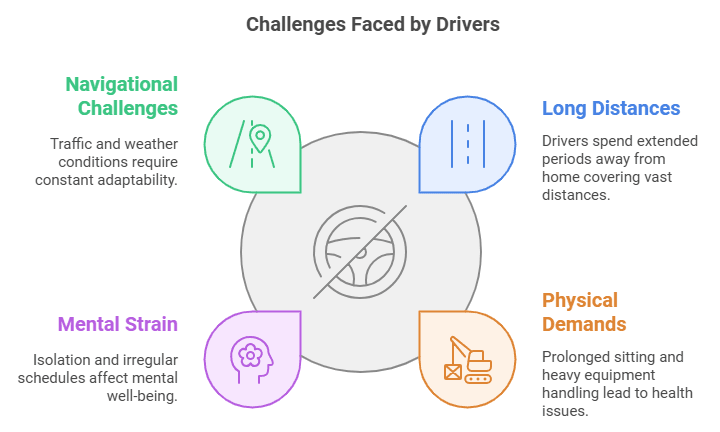
Rewards of the Profession
- Economic Opportunities: Competitive salaries, bonuses, and benefits, especially for specialized drivers or owner operators.
- Independence: The freedom of the open road and the ability to operate independently appeal to many drivers.
- Diverse Experiences: Exposure to different regions, cultures, and landscapes across the country.
- Job Security: Consistent demand for goods transportation ensures steady employment opportunities.

Staying Connected and Healthy
Truck truck drivers find ways to stay connected with loved ones and maintain their health:
- Technology: Use of smartphones and apps to communicate and access entertainment.
- Fitness Routines: Incorporating exercises during breaks and choosing healthier food options when possible.
- Community: Engaging with other drivers through social media groups and forums for support and camaraderie.
For drivers looking to express their personal style, check out the latest in bulk trucker hats, a popular accessory that combines function and fashion.
3. The Role of Owner-Operators in the Trucking Industry
Owner-operators are truck truck drivers who own and operate their own trucks, offering services as independent contractors.
Advantages of Being an Owner-Operator
- Business Control: Ability to choose clients, set schedules, and make operational decisions.
- Higher Earning Potential: Keeping a larger share of revenues after expenses can lead to increased earnings.
- Asset Ownership: Building equity in their equipment and business.
Challenges Faced
- Financial Responsibility: Bearing the costs of truck purchase, maintenance, fuel, insurance, and taxes.
- Regulatory Compliance: Staying updated with DOT and FMCSA regulations, including record-keeping and reporting.
- Market Risks: Dealing with fluctuating freight rates and economic conditions.
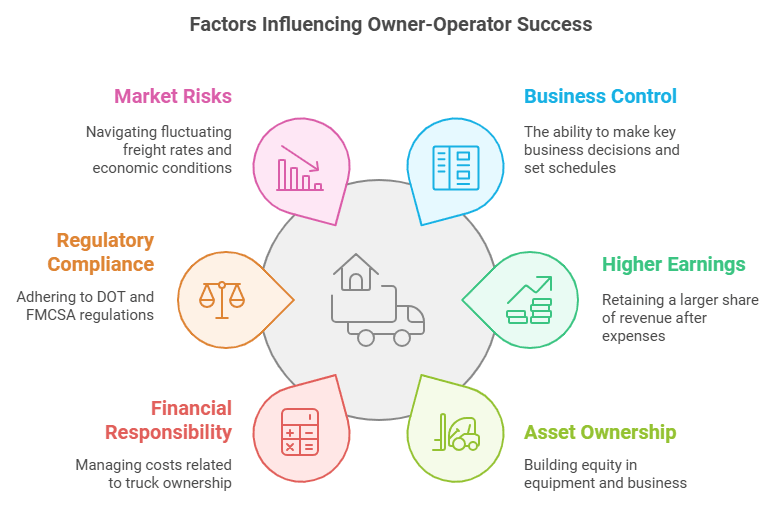
Navigating the Industry
Success as an owner-operator requires:
- Business Acumen: Understanding contracts, negotiations, and financial management.
- Networking: Building relationships with shippers, brokers, and other industry professionals.
- Adaptability: Embracing new technologies and market trends to stay competitive.
The future of trucking, including the rise of electric trucks, presents new opportunities and challenges for owner-operators. Learn about upcoming innovations like the 2025 Caterpillar Pickup Truck that could redefine the industry.
4. Safety Regulations and Compliance
Safety is paramount in the trucking industry, with strict regulations enforced to protect drivers and the public. The American Trucking Association provides comprehensive resources and guidelines for maintaining safety standards in the trucking industry.
Key Regulatory Bodies
- Department of Transportation (DOT): Oversees national transportation policies and regulations.
- Federal Motor Carrier Safety Administration (FMCSA): Focuses on reducing crashes, injuries, and fatalities involving large trucks and buses.
Essential Safety Regulations
- Hours of Service Limits: Drivers can drive a maximum of 11 hours after 10 consecutive hours off duty.
- Electronic Logging Devices (ELDs): Mandatory use of ELDs to record driving time and ensure compliance.
- Vehicle Maintenance: Regular inspections and maintenance to keep vehicles in safe operating condition.
- Drug and Alcohol Testing: Mandatory testing to prevent substance abuse among drivers.
Impact on Drivers
Compliance requires diligence and organization:
- Record-Keeping: Maintaining accurate logs of hours driven, rest periods, and vehicle inspections.
- Adherence to Rules: Understanding and following rules to avoid penalties and maintain safety records.
- Continuous Education: Staying informed about regulatory updates and industry best practices.
For insights on how innovation is impacting safety and efficiency, read about the Hummer EV SUV Adapter for Tesla Supercharger, showcasing advancements in vehicle technology.
5. The Future of Truck Truck Driving
The trucking industry is evolving, influenced by technology, environmental concerns, and economic shifts. The U.S. Department of Energy’s recent study on freight trucking electrification reveals promising developments for sustainable transportation.
Technological Advancements
- Autonomous Vehicles: Development of self-driving trucks aims to improve safety and efficiency, though widespread adoption is years away.
- Telematics and GPS: Enhanced tracking and communication systems streamline logistics and route planning.
- Electric and Alternative Fuel Trucks: Reducing emissions and fuel costs through electric vehicles and alternative fuels.
Economic and Environmental Factors
- E-Commerce Growth: Increased online shopping amplifies the demand for trucking services, especially in last-mile deliveries.
- Driver Shortages: Aging workforce and recruitment challenges lead to high demand for qualified drivers.
- Sustainability Initiatives: Pressure to reduce carbon footprints prompts investment in greener technologies.
Opportunities for Drivers
- Skills Upgrading: Embracing technology and continuous learning can enhance career prospects.
- Specialization: Focusing on niche markets like refrigerated goods, hazardous materials, or oversized loads can increase earning potential.
- Entrepreneurship: Exploring roles beyond driving, such as logistics coordination or fleet management.
The Bureau of Labor Statistics projects steady demand for truck drivers, making it a viable long-term career. For those interested in experiencing the trucking world virtually, our guide on how to download American Truck Simulator mods offers a fun way to explore the industry.
6. The Importance of Truck Truck Drivers to the Economy
Truck truck drivers are integral to the nation’s economic health, ensuring seamless movement of goods.
Economic Contributions
- Freight Transportation: Trucks move approximately 70% of all freight in the United States.
- Job Creation: The trucking industry employs millions, including drivers, dispatchers, mechanics, and support staff.
- Supply Chain Vitality: Reliable trucking maintains inventory levels, supports just-in-time manufacturing, and fulfills consumer demand.
Impact During Emergencies
- Disaster Relief: Drivers deliver essential supplies during natural disasters and crises.
- Pandemic Response: During COVID-19, truck truck drivers played a crucial role in transporting medical supplies and everyday necessities.
Challenges to Industry Stability
- Infrastructure Issues: Aging roads and bridges can hinder efficient transportation.
- Regulatory Changes: Shifts in policies can impact operational costs and industry dynamics.
- Global Competition: International trade policies affect freight volumes and routes.
Recognizing the contributions of truck truck drivers encourages support for policies and initiatives that enhance the industry’s sustainability and growth.
7. How to Start a Career as a Truck Truck Driver
Embarking on a career as a truck truck driver involves several key steps:
1. Research the Profession
- Understand the Lifestyle: Assess if long hours on the road and time away from home align with personal goals.
- Job Opportunities: Explore different types of trucking jobs, such as regional, local, or specialized hauling.
2. Meet Basic Requirements
- Age: Must be at least 21 years old for interstate trucking, though some states allow intrastate driving at 18.
- Education: Possess a high school diploma or equivalent.
3. Obtain a CDL
- Choose the Right Class: Determine if you need a Class A, B, or C license based on the vehicles you plan to drive.
- Enroll in Training: Attend a reputable truck driving school to gain necessary skills.
4. Pass Required Tests
- Knowledge Test: Covers road rules, vehicle operation, and safety regulations.
- Skills Test: Involves a pre-trip vehicle inspection, basic control skills, and on-road driving.
5. Complete Endorsements
- Specializations: Obtain endorsements for transporting hazardous materials, tankers, or double/triple trailers if desired.
6. Begin Job Search
- Employers: Apply to trucking companies, or consider starting as an owner-operator.
- Networking: Join industry associations and attend job fairs.
7. Maintain and Advance Your Career
- Continuing Education: Stay informed about industry changes and pursue additional certifications.
- Safety Records: Prioritize safe driving to enhance reputation and job security.
Starting a career as a truck truck driver can be rewarding for those who appreciate independence and have a passion for driving.

Conclusion
Truck truck drivers play an essential and often underappreciated role in our daily lives. They face numerous challenges, from rigorous safety regulations to the physical and mental demands of the job. Yet, their dedication keeps our economy thriving and connects communities across vast distances.
As the industry evolves with technological advancements and changing economic landscapes, truck truck drivers continue to adapt. Whether you’re considering a career behind the wheel or simply want to understand the individuals who ensure store shelves are stocked and packages arrive on time, recognizing the value of truck truck drivers is crucial.
Next time you pass a truck on the highway, remember the hardworking truck truck driver at the helm, navigating the open road to keep the world moving.
Let me know if you would like any adjustments or further refinements to this article!
There are no reviews yet. Be the first one to write one.


